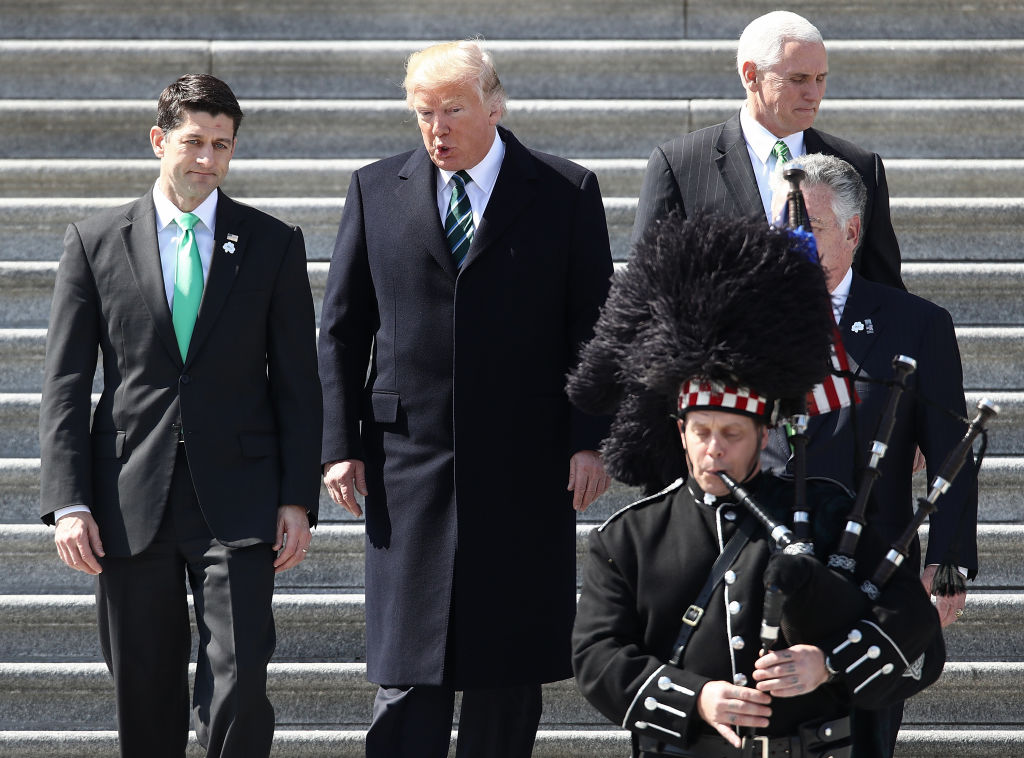To pay for Trump's border wall and military buildup, House Republicans target the safety net


A free daily email with the biggest news stories of the day – and the best features from TheWeek.com
You are now subscribed
Your newsletter sign-up was successful
In the latest omnibus spending bill, President Trump got no money for his proposed border wall with Mexico, and Democrats won an increase in funding for the National Institutes of Health. Trump also got a big bump in military spending, and Democrats lost quite a bit, but "enraged by Democrats claiming victory after last month's government funding agreement, White House officials in recent weeks have pressed Hill Republicans to include more Trump priorities in the fiscal 2018 blueprint," Politico reports, and House Republicans are obliging.
Republicans are facing competing pressures and ideological priorities when writing their budget blueprint: Trump's expensive spending wish list — including infrastructure spending, the border wall, and the military — his campaign promises not to cut Medicare and Social Security, their longterm promises to shrink America's public debt and balance the budget, the GOP wish list of large tax cuts, and the political realities exposed in the fight to pass their health-care bill. Given those choices, House Republicans are considering cutting more than $400 billion, largely from domestic programs like food stamps, financial support for disabled adults and needy children, and maybe even veterans benefits.
"The critique last time was that we didn't embed enough Trump agenda items into our budget," Rep. Dave Brat (R-Va.), a budget panel member, tells Politico. Trump has "made it clear it will be embedded in this budget. ... And so people will see a process much more aligned with President Trump's agenda in this forthcoming budget." The White House reportedly backs cuts to the same safety-net programs, which will be left to individual committees to flesh out. It is unclear what Senate Republicans will do, but the plan is to use the budget reconciliation process, meaning they'd need only a simply majority to pass the budget. You can read more about the GOP plans at Politico.
The Week
Escape your echo chamber. Get the facts behind the news, plus analysis from multiple perspectives.

Sign up for The Week's Free Newsletters
From our morning news briefing to a weekly Good News Newsletter, get the best of The Week delivered directly to your inbox.
From our morning news briefing to a weekly Good News Newsletter, get the best of The Week delivered directly to your inbox.
A free daily email with the biggest news stories of the day – and the best features from TheWeek.com
Peter has worked as a news and culture writer and editor at The Week since the site's launch in 2008. He covers politics, world affairs, religion and cultural currents. His journalism career began as a copy editor at a financial newswire and has included editorial positions at The New York Times Magazine, Facts on File, and Oregon State University.
-
 Political cartoons for February 22
Political cartoons for February 22Cartoons Sunday’s political cartoons include Black history month, bloodsuckers, and more
-
 The mystery of flight MH370
The mystery of flight MH370The Explainer In 2014, the passenger plane vanished without trace. Twelve years on, a new operation is under way to find the wreckage of the doomed airliner
-
 5 royally funny cartoons about the former prince Andrew’s arrest
5 royally funny cartoons about the former prince Andrew’s arrestCartoons Artists take on falling from grace, kingly manners, and more
-
 British warship repels 'largest Houthi attack to date' in the Red Sea
British warship repels 'largest Houthi attack to date' in the Red SeaSpeed read Western allies warn of military response to Iranian-backed Yemeni rebels if attacks on ships continue
-
 Houthi rebels claim Red Sea ship attacks
Houthi rebels claim Red Sea ship attacksspeed read Iran-backed Yemeni group vows to escalate aggression towards Israel-linked vessels in revenge for Gaza war
-
 Israel plans next phase of Gaza war as first hostages released
Israel plans next phase of Gaza war as first hostages releasedSpeed read After four-day ceasefire 'we will not stop' until destruction of Hamas, says Israel
-
 Mob storms Russian airport 'looking for Jews'
Mob storms Russian airport 'looking for Jews'Speed Read Plane from Israel surrounded by rioters chanting antisemitic slogans after landing in Russia's Dagestan region
-
 Tuberville's military promotions block is upending lives, combat readiness, 3 military branch chiefs say
Tuberville's military promotions block is upending lives, combat readiness, 3 military branch chiefs saySpeed Read
-
 Ukraine's counteroffensive is making incremental gains. Does it matter in the broader war?
Ukraine's counteroffensive is making incremental gains. Does it matter in the broader war?Speed Read
-
 US commissions first-ever Navy ship in a foreign port
US commissions first-ever Navy ship in a foreign portSpeed Read
-
 British spy chief, Wagner video suggest Prigozhin is alive and freely 'floating around'
British spy chief, Wagner video suggest Prigozhin is alive and freely 'floating around'Speed Read
